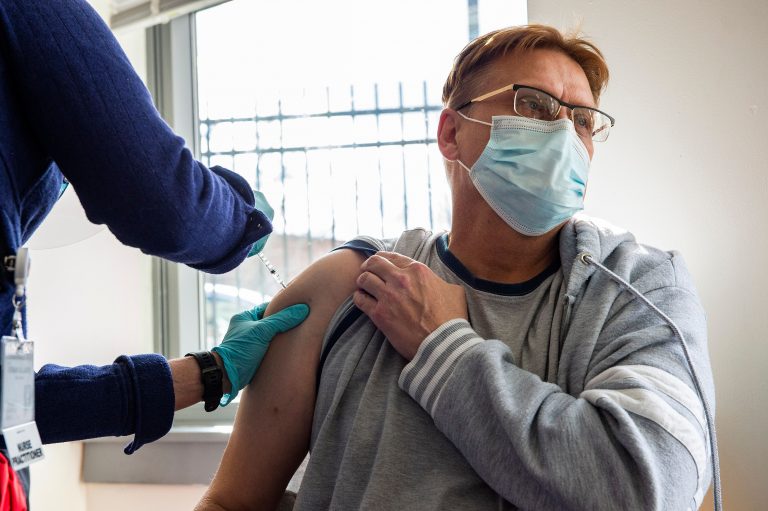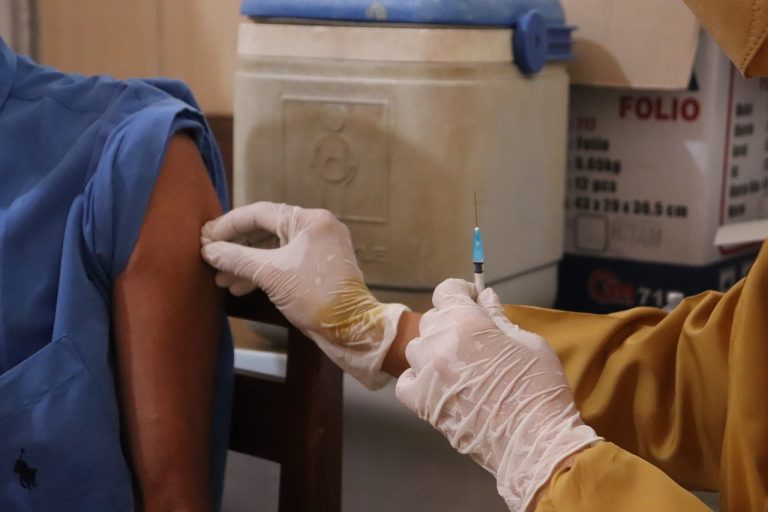Updated March 28, 2021
With the recent emergency use authorization of the Pfizer-BioNTech and Moderna coronavirus vaccines in Dec. 2020 and Johnson & Johnson (J&J)/Janssen vaccine in Feb. 2021, hope for the possible end of the pandemic is on the horizon. However, below are five things to take into account before getting the injections.
1. Vaccine adverse events are commonly underreported and are solicited only within seven days after each coronavirus vaccine injection
Vaccines are one of the only medical interventions given to healthy people to help prevent infection. Particularly for young children, accurate reporting of adverse events and rigorous testing ensuring safety and effectiveness is vital to avoid irreversible damage. Unfortunately, adverse events from vaccines are commonly underreported. The Agency for Healthcare Research Quality (AHRQ) used machine cluster analysis, an artificial intelligence counting method, and found that the actual rate of vaccine injury was approximately 2.6% between 2006 and 2009. That is to say, 1 in 40 people suffered from an adverse reaction. Since less than 1% of vaccine adverse events are reported to the Food and Drug Administration (FDA), the public health programs are limited in their ability to respond to problematic vaccines in a timely and safe manner [1].

According to the Centers for Disease Control and Prevention (CDC) COVID Data Tracker, as of Mar. 28, 2021, about 73 million doses of the Pfizer-BioNTech vaccine, 67 million doses of the Moderna vaccine, and 3 million doses of the J&J/Janssen vaccine have been administered. A wide range of possible adverse reactions to these coronavirus vaccines have been uncovered using the CDC and FDA Vaccine Adverse Event Reporting System (VAERS) data and the CDC WONDER search tool. VAERS reports are not automatically submitted, and are filed by anybody including medical professionals, patients, and family members. The VAERS website states, “VAERS is not designed to detect if a vaccine caused an adverse event, but it can identify unusual or unexpected patterns of reporting that might indicate possible safety problems requiring a closer look.” The reported adverse events are significant safety concerns that should be further evaluated and reported to the general public so that people can give informed consent with knowledge of all possible risks and benefits.

Success
You are now signed up for our newsletter
Success
Check your email to complete sign up
Some of the most common COVID-19 vaccine side effects were fever, chills, flushing, fatigue, headaches, tingling, numbness, decreased sensation, nausea, injection site pain, rash, and diffuse pain or aches. Based on 44,606 VAERS reports through Mar. 19, 2021 predominantly submitted within the United States, there have been 2050 deaths, 4450 hospitalizations, 7485 urgent care visits, 6759 office visits, 354 cases of anaphylaxis, and 421 cases of Bell’s palsy after COVID-19 vaccine administration. Since vaccine side effects are known to be grossly underreported, the actual number of adverse events are likely much higher. Of note, in the ongoing Phase III clinical trials for the Pfizer-BioNTech and Moderna vaccines, adverse reactions are only solicited within 7 days after the first or second dose. Unsolicited adverse reactions are tracked afterwards, but it is up to vaccine recipients themselves to report these events [3, 4]. Similarly, in the Phase I to IIa J&J/Janssen clinical trial, solicited adverse events are only collected 7 days after vaccination, with unsolicited data collected 29 days after vaccination and unsolicited severe adverse events collected throughout the course of the trial. In other words, if a patient suffers a severe adverse reaction on day 8 after a coronavirus vaccine injection, the event is not reported unless the vaccine recipient or somebody who knows the recipient decides to report the event without being asked.
2. Pharmaceutical companies have a history of criminal fraud and are not liable for vaccine-related injuries
Based on the National Childhood Vaccine Injury Act of 1986 (also known as the Vaccine Act) passed by Congress, if a vaccine injures a person, no matter how toxic the ingredients or severe the injury, the drug companies are not liable. Instead, when a party files a claim of harm that could feasibly be related to a vaccine, the case is reviewed by the Vaccine Injury Compensation Program and either sent to be defended in a federal claims court or awarded compensation by a government program. In other words, pharmaceutical companies do not have to pay compensation because tax money is used instead [5]. More recently, on February 4, 2020, Health and Human Services Secretary Alex Azar invoked the 2005 Public Readiness and Emergency Preparedness Act. This is a blanket immunity law that provides legal protection to Pfizer, Moderna, and other vaccine producers such that they are not liable for side effects, no matter how severe [6]. The list of compensated illnesses, disabilities, injuries, or conditions associated with vaccines are detailed here.

According to ProPublica, big pharma companies that include major vaccine producers have a history of serial criminal fraud. Four of the top 10 vaccine manufacturers in the world are Pfizer, Merck & Co, GlaxoSmithKline, and Sanofi. In September 2009, Pfizer was fined $2.3 billion and pled guilty to misbranding Bextra, a painkiller, with “intent to defraud or mislead,” encouraging the drug to be taken in dangerously high dosages. Pfizer also allegedly promoted three other drugs, named Geodon, Zyvox, and Lyrica illegally. In November 2011, Merck was fined $950 million for illegally promoting the painkiller Vioxx and making false or misleading statements about the drug’s heart safety despite its association with heart attacks. In July 2012, GlaxoSmithKline paid $3 billion for falsely promoting drugs, including misbranding the anti-depression drug Paxil, and failing to report safety data to the FDA about the diabetes drug Avandia. In December 2012, Sanofi-Aventis paid $109 million to resolve allegations of illegally encouraging physicians to buy its products by giving free units of the joint inflammation drug Hyalgan, and submitting false price reports worth millions of dollars to U.S. government health care programs [7].

3. Many vaccines given today have not been tested against a true placebo
Until recently, vaccines were one of the only medical products that did not have to be safety-tested against a true placebo. In fact, several vaccines administered to children today have never undergone true placebo testing. The CDC defines a placebo as “a substance or treatment that has no effect on human beings” [8]. The 2013 WHO Expert Consultation document states, “In place of a placebo, a vaccine against a disease that is not the focus of the trial is given to participants who do not receive the trial vaccine.” Alternatively, “add-on” vaccines are used: “the trial vaccine or placebo product is mixed with an existing vaccine not studied in the trial.” In other words, many vaccines are not tested against a true placebo, and are instead tested against other vaccines that contain the same or similar toxic ingredients present in all vaccines. Indeed, the WHO concedes that “it may be difficult or impossible to assess fully the safety and reactogenicity of the trial vaccine, although its efficacy can usually be assessed satisfactorily” [9].
As an example, clinical trial data from the National Institute of Health (NIH) shows that the Engerix B Hepatitis B vaccine (Recombinant) from GlaxoSmithKline was tested against plasma-derived vaccines instead of a true placebo. The results of this study showed that the Hepatitis B vaccine did not cause any more harm than other vaccines would cause, and this was the standard of measure used for its adoption. Furthermore, subjects were monitored only for 4 days after drug administration, thus patients who suffered from mild to severe adverse reactions on day 5 or later were not reported [10]. In addition, seven clinical trials were conducted with the Gardasil vaccine from Merck, with 15,706 participants receiving Gardasil, 13,023 participants receiving Amorphous Aluminum Hydroxyphosphate Sulfate (AAHS) that is commonly present in vaccines, and 594 participants receiving a saline placebo. However, since the saline placebo group was combined with the much larger AAHS control group, the studies primarily compared Gardasil to toxic ingredients present in Gardasil and other vaccines. Again, Gardasil was only proven to not cause more harm than other vaccines [11], and thereby approved for use.
4. Coronavirus vaccine trials: accelerated timeline with unknown long-term risks
With regard to coronavirus vaccine trials, a long and hard-fought battle has been raging for several months to convince the FDA to modify federal guidelines. According to the Informed Consent Action Network (ICAN), in response to the Phase III coronavirus vaccine trial by AstraZeneca and the University of Oxford in England that was using a different vaccine called Menveo instead of a true placebo as a control, ICAN filed a petition in June 2020 to require a placebo control and track long-term safety. It was only after this petition that the FDA modified its position and issued emergency guidance to industry that all clinical trials were required to use a placebo control. Multiple subsequent ICAN petitions and lawsuits were filed to further promote vaccine safety, such as demanding tracking of adverse events for longer durations, and these documents can be found on the ICAN website. It is important to note that the majority of ongoing vaccine trials do not study the spread of the disease or whether a vaccine recipient can still transmit coronavirus to others [12]. Until completion, these studies will provide incomplete evidence regarding the duration of protection, the efficacy of protection against new mutant variants of the coronavirus, and the efficacy of the vaccine in people who previously had a coronavirus infection.
According to Johns Hopkins, the vaccine development timeline typically takes 5 to 10 years or longer to determine whether a vaccine is safe and efficacious, to undergo regulatory approval, and to be manufactured for distribution. Some coronavirus trials have combined phases I and II to save time, while others have combined phases II and III. Vaccine manufacturers typically wait until phase III trial analyses are complete before submitting a Biologics License Application with data on vaccine safety, immune responses, and efficacy for review and approval [13]. Learn more about clinical trial phases from the NIH here.
On Dec. 11, 2020, the FDA issued an emergency use authorization (EUA) for the Pfizer-BioNTech coronavirus vaccine to be distributed in the U.S. while studies of safety and efficacy are still ongoing. Soon after, on Dec. 18, 2020, the FDA granted authorization to Moderna’s coronavirus vaccine [14]. On Feb. 27, 2021, EUA was also granted to the J&J/Janssen coronavirus vaccine for individuals 18 years of age and older. Full approval for these coronavirus vaccines will likely not occur until several months later.
The CDC recommends not taking the coronavirus vaccine if seriously allergic to any of the ingredients [15]. Please refer to the vaccine prescribing information charts with ingredients for Pfizer-BioNTech, Moderna, and J&J/Janssen. The Pfizer Phase III clinical trial that is estimated to run through Jan. 2023 includes healthy participants 12 years or older and excludes patients with a history of coronavirus, treatment with immunosuppressive therapy, diagnosis with an immunocompromising condition, or who are pregnant or breastfeeding [4]. According to the CDC, immunosuppressants that can weaken the immune system such as oral or intravenous corticosteroids are commonly used in conditions such as rheumatoid arthritis, lupus, and inflammatory bowel disease [16]. Similarly, Moderna’s Phase III clinical trial that is estimated to run through Oct. 2022 includes healthy adults or adults with pre-existing medical conditions who are in stable condition with no significant changes in treatment or hospitalizations during the last three months, and excludes people who are pregnant, breastfeeding, or in an immunosuppressive or immunodeficient state [17]. The J&J/Janssen Phase I to IIa clinical trial includes healthy adults between 18 and 55 years old or adults 65 years of age or older in good health with or without stable underlying conditions and has an estimated completion date in Feb. 2024. Two other J&J/Janssen Phase III clinical trials that will “evaluate the efficacy of either a single-dose or two-dose regimen of the lower dose (5×1010 viral particles)” of the vaccine have estimated completion dates in Jan. 2023 and May 2023.
5. The U.S. Department of Health and Human Services failed to provide safety reports to Congress for 30 years
According to the nonprofit organization PR Newswire, Informed Consent Action Network (ICAN) successfully sued the U.S. Department of Health and Human Services (HHS) in 2018 after the HHS refused to acquiesce to a Freedom of Information Act (FOIA) request from ICAN for eight months. Since 1988, the HHS has been required to submit reports about improvements made to vaccine safety every two years. However, HHS refused to make these reports public and eventually conceded that the reports did not exist. Del Bigtree, founder of ICAN, stated, “The 1986 National Childhood Vaccination Injury Act granted economic immunity to pharmaceutical companies for vaccine injuries… It is apparent that HHS doesn’t have a clue as to the actual safety profile of the now 39 doses, and growing, of vaccines given by one year of age, including in utero” [18]. The hope is that this lawsuit will encourage HHS to take vaccine safety more seriously.
In addition, the Data and Safety Monitoring Boards (DSMBs) overseeing coronavirus vaccine trials may have conflicts of interest. These boards are supposed to be independent, but their members are selected secretly, and they meet privately. A thorough ICAN investigation revealed likely conflicts of interest with members Dr. Richard Whitley and Dr. Kathryn Edwards, whose identities were mistakenly revealed. Allegedly, these doctors have been consultants for numerous drug companies, paid speakers, and have financially benefited from these companies [19].

On the surface, the preliminary clinical trial analyses for coronavirus vaccines look promising, with 95% efficacy in a Pfizer and BioNTech’s clinical trial, 94.1% efficacy in a Moderna and the National Institute of Allergy and Infectious Diseases’ (NIAID) clinical trial, and 66.3% efficacy in a J&J/Janssen clinical trial. However, the criminal history of major vaccine producers, implementation of stricter FDA guidelines only after ICAN’s petitions and lawsuits, potential bias of the overseeing DSMBs, lack of long-term data, and lack of determination if vaccine recipients can transmit coronavirus to others, do not instill confidence that the public’s best interests are a top priority.
Although there are enormous potential benefits to the new coronavirus vaccines, the accelerated timeline, unknown long-term risks, and questionable history of vaccine producers should all be taken into account. Everyone is encouraged to do their own research and make their own decisions.
Works Cited
| [1] | R. Lazarus, “Electronic Support for Public Health–Vaccine Adverse Event Reporting System (ESP:VAERS),” The Agency for Healthcare Research and Quality (AHRQ) U.S. Department of Health and Human Services, Rockville, Maryland, 2011. |
| [2] | CDC, “About The Vaccine Adverse Event Reporting System (VAERS),” 15 January 2021. [Online]. Available: https://wonder.cdc.gov/controller/datarequest/D8. [Accessed 15 January 2021]. |
| [3] | L. Baden, H. El Sahly, B. Essink, K. Kotloff, S. Frey, R. Novak, D. Diemert, S. Spector, N. Rouphael, C. Creech, J. McGettigan, S. Kehtan, N. Segall, J. Solis, A. Brosz, C. Fierro, H. Schwartz, K. Neuzil, L. Corey, P. Gilbert, H. Janes and D. Follmann, “Efficacy and Safety of the mRNA-1273 SARS-CoV-2 Vaccine,” 30 December 2020. [Online]. Available: https://www.nejm.org/doi/full/10.1056/NEJMoa2035389. [Accessed 2 January 2021]. |
| [4] | F. Polack, S. Thomas, N. Kitchin, J. Absalon, A. Gurtman, S. Lockhart, J. Perez, M. G. Pérez, E. Moreira, C. Zerbini, R. Bailey, K. Swanson, S. Roychoudhury, K. Koury, P. Li, W. Kalina, D. Cooper, R. J. Frenck, L. Hammitt, Ö. Türeci and H. Nell, “Safety and Efficacy of the BNT162b2 mRNA coronavirus Vaccine,” N Engl J Med, vol. 383, no. 27, pp. 2603-2615, 31 December 2020. |
| [5] | J. Hamblin, “https://www.theatlantic.com/health/archive/2019/05/vaccine-safety-program/589354/,” 14 May 2019. [Online]. |
| [6] | CNBC, “You can’t sue Pfizer or Moderna if you have severe Covid vaccine side effects. The government likely won’t compensate you for damages either,” 17 December 2020. [Online]. Available: https://www.cnbc.com/2020/12/16/covid-vaccine-side-effects-compensation-lawsuit.html. |
| [7] | L. Groeger, “Big Pharma’s Big Fines,” 24 February 2014. [Online]. Available: https://projects.propublica.org/graphics/bigpharma. |
| [8] | CDC, “Vaccines & Immunizations – Glossary,” 30 July 2020. [Online]. Available: https://www.cdc.gov/vaccines/terms/glossary.html. |
| [9] | WHO, “Expert Consultation on the Use of Placebos in Vaccine Trials,” 2013. [Online]. Available: https://apps.who.int/iris/bitstream/handle/10665/94056/9789241506250_eng.pdf;jsessionid=CEC55188988B99746BBB3E834C50A273?sequence=1. |
| [10] | GlaxoSmithKline, “ENGERIX-B,” 2007. [Online]. Available: https://dailymed.nlm.nih.gov/dailymed/archives/fdaDrugInfo.cfm?archiveid=17369. |
| [11] | Merck, “Highlights of Prescribing Information,” 2011. [Online]. Available: https://www.merck.com/product/usa/pi_circulars/g/gardasil/gardasil_pi.pdf. |
| [12] | ICAN, “coronavirus Vaccine Clinical Trials: Failure to Properly Assess Safety and Efficacy,” November 2020. [Online]. Available: https://www.icandecide.org/ican_covid/covid-19-vaccine-clinical-trials-failure-to-properly-assess-safety-and-efficacy/. |
| [13] | Johns Hopkins, “Vaccine Research Development,” 2020. [Online]. Available: https://coronavirus.jhu.edu/vaccines/timeline. |
| [14] | FDA, “coronavirus Vaccines,” December 2020. [Online]. Available: https://www.fda.gov/emergency-preparedness-and-response/coronavirus-disease-2019-covid-19/covid-19-vaccines. |
| [15] | J. Ries, “Here Are the CDC Guidelines for Allergic Reactions to coronavirus Vaccines,” 21 December 2020. [Online]. Available: https://www.healthline.com/health-news/here-are-the-cdc-guidelines-for-allergic-reactions-to-covid-19-vaccines. |
| [16] | CDC, “If You Are Immunocompromised, Protect Yourself From coronavirus,” 16 December 2020. [Online]. Available: https://www.cdc.gov/coronavirus/2019-ncov/need-extra-precautions/immunocompromised.html. |
| [17] | NIH, “A Study to Evaluate Efficacy, Safety, and Immunogenicity of mRNA-1273 Vaccine in Adults Aged 18 Years and Older to Prevent coronavirus,” 28 October 2020. [Online]. Available: https://clinicaltrials.gov/ct2/show/NCT04470427?term=moderna&cond=coronavirus&draw=2. |
| [18] | PR Newswire, “ICAN vs. HHS: Key Legal Win Recasts Vaccine Debate,” 14 September 2018. [Online]. Available: https://www.prnewswire.com/news-releases/ican-vs-hhs-key-legal-win-recasts-vaccine-debate-300712629.html. |
| [19] | ICAN, “coronavirus Vaccines: Clinical Trials,” 2020. [Online]. Available: https://www.icandecide.org/covid-backup/vaccinetrials/. |













